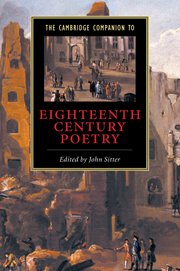Book contents
- Frontmatter
- 1 Introduction
- 2 Couplets and conversation
- 3 Political passions
- 4 Publishing and reading poetry
- 5 The city in eighteenth-century poetry
- 6 “Nature” poetry
- 7 Questions in poetics
- 8 Eighteenth-century women poets and readers
- 9 Creating a national poetry
- 10 The return to the ode
- 11 A poetry of absence
- 12 The poetry of sensibility
- 13 “Pre-Romanticism” and the ends of eighteenth-century poetry
- Index
5 - The city in eighteenth-century poetry
Published online by Cambridge University Press: 28 May 2006
- Frontmatter
- 1 Introduction
- 2 Couplets and conversation
- 3 Political passions
- 4 Publishing and reading poetry
- 5 The city in eighteenth-century poetry
- 6 “Nature” poetry
- 7 Questions in poetics
- 8 Eighteenth-century women poets and readers
- 9 Creating a national poetry
- 10 The return to the ode
- 11 A poetry of absence
- 12 The poetry of sensibility
- 13 “Pre-Romanticism” and the ends of eighteenth-century poetry
- Index
Summary
How was the city imagined in eighteenth-century poetry? To chart the territory, and measure the distance that the reader traverses in the journey from early to late century, a reader might compare two poems: Jonathan Swift's “A Description of a City Shower,” first published in The Tatler 238 on 17 October 1710, and William Blake's “London”, the eighth poem in the “Experience” section of his Songs of Innocence and of Experience (1794). (Texts given at the end of the chapter.)
In Swift’s poem, a worsening rain shower becomes a downpour and finally merges with the “flood” of the Fleet River, London’s open sewer flowing down from the north towards the Thames. Its serpentine slither collects up the town’s effluent disemboguing into the river from Smithfield Market, conveys the rubbish via St. Sepulchre’s Church (whose bells would send prisoners under sentence of death on their way to Tyburn to be hanged) and deposits it into the Holborn conduit via Snow Hill stream. At least half-seriously, the topographical organization is also a moral organization by the poem’s close: the gradually gathering inundation and the term “flood” cannot but suggest the early chapters of Genesis in which Noah’s flood is described and, shortly afterwards, the wicked cities are destroyed – London, Swift subliminally suggests, is the new Sodom/Gomorrah. Various aspects of city life, realistic observations of the effects of rain on urban dwellers (metonyms) are ratchetted up into metaphors for the condition of city life – its squalor, crowdedness, and degradation.
- Type
- Chapter
- Information
- The Cambridge Companion to Eighteenth-Century Poetry , pp. 83 - 108Publisher: Cambridge University PressPrint publication year: 2001
- 4
- Cited by



